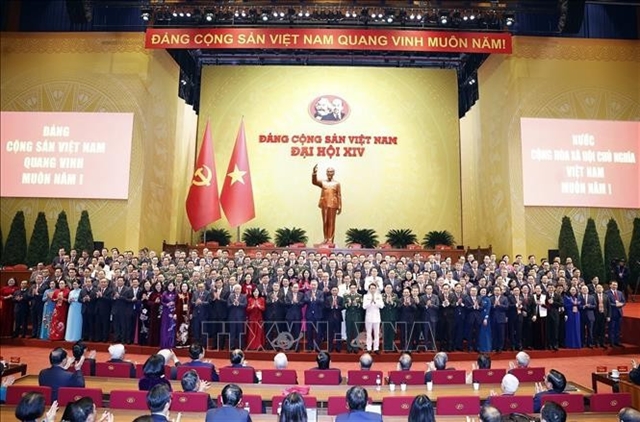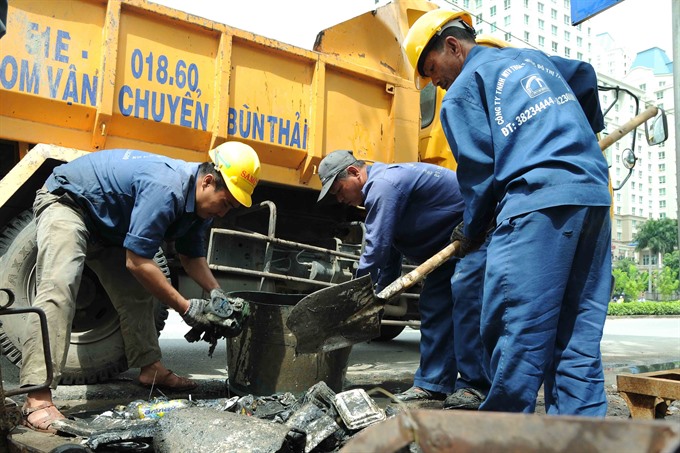 Society
Society

Many street cleaners in HCM City have quit their jobs because of the hard work - and wages and bonuses that tend to decline year by year, Tuổi Trẻ (Youth) newspaper reported.
 |
| Drainage workers in HCM City remove waste from sewers on Nguyễn Hữu Cảnh Street in Bình Thạnh District. — VNA/VNS Photo An Hiếu |
HCM CITY — Many street cleaners in HCM City have quit their jobs because of the hard work - and wages and bonuses that tend to decline year-by-year, Tuổi Trẻ (Youth) newspaper reported.
The cleaners, described by one Westerner as the hardest working people in Việt Nam because of their dedication to cleaning streets in hot, freezing or wet weather, are also asked to plant and look after street trees.
One male cleaner told the newspaper that many of his colleagues were moving to factory work. “We go to work, no matter if it’s sunny or rainy, even until 1am to 2am at New Year. Wages and bonus are so small,” he said.
Many cleaners have switched to other jobs, but many cannot find new work or are fearful of change, he said.
Another cleaner named Hải, 53, took up a job caring for plants two years ago after abdoning his cleaning job.
Lê Văn Luông, 47, was asked to leave his job at District 12’s Public Service Company because he was told there was no work. About 50 per cent of the company’s labourers have had no work since last July. They were told to quit in October.
“The company owes labourers social-insurance and danger money for many months," he said. "And we may not receive our unemployment insurance payments.”
According to Huỳnh Minh Nhựt, director of the Urban Environmental MTV Company, 50 out of its 400 garbage collectors asked to leave work last year. They included 20 working at Tân Xuân Market in Hóc Môn District. The company has been trying to recruit labourers, but there have been few takers.
The average wage for these labourers working in a highly polluted environments is only VNĐ8 million (US$350) a month. Many quit to start lower-paid jobs as a textile worker for VNĐ6 million ($260) a month, but the work is far less physical, he said.
Wages for cleaners are predicted to fall further in future. Vũ Quốc Bảo, director of Thủ Đức District’s Public Service Company said: “We have been trying to pay wages for labourers, but have no plan for Tết (Lunar New Year) bonuses. We have to wait until the end of the year to count annual losses and benefits to talk exactly about the issue.”
Representatives of public-service companies said that wages were declining because of low service costs. Waste collection and transport fees collected by companies are not enough to pay for fuel, repairs and wages.
The Ministry of Construction cut down labour costs by nearly 80 per cent in 2014 and reduced cleaning machine costs by 44 per cent.
The city’s People’s Committee cut waste-collection payments by half, leading to declining profits of public service companies. Many of them are still carrying tax debts from previous years.
However, there is some hope. Bidding has started under a series of new criteria for cleaners in State-owned public-service companies in HCM City.
This requires tree planters to have an engineering degree and labour safety certificates. Many companies fail to meet this criterion. Team leaders of these companies mostly use labourers without degrees who are only promoted after years of experience. This is one of the reasons many companies are eliminated from bidding.
Nguyễn Hoàng Dũng, director of HCM City’s Economics and Management Institute, said State-owned public service companies fell into a difficult state because they were not sensitive to the market and slow in innovating products and services.
Dũng proposed State-owned public service companies be equitised to be able to make changes easier.
BOX
This month, HCM City’s Department of Labour, Invalids and Social Affairs will supervise wage and Tết bonus payments made by local enterprises. The enterprises will be those that owe or are at risk of owing wages and bonuses.
Enterprises that have been punished by the administration in the labour sector or are owing social-insurance premiums will be high on the list. — VNS




